Judi Lynn
Judi Lynn's JournalLula vowed to safeguard the Amazon. After Bolsonaro, it won't be easy.
By Paulina Villegas and Sarah Kaplan
October 31, 2022 at 6:53 p.m. EDT

An area of Amazon forest is cut down on private rural property in Brazil's Acre state in July. (Rafael Vilela for The Washington Post)
BRASILIA — When Luis Inácio Lula da Silva was elected president of Brazil on Sunday, Gustavo Conde felt a sense of relief — for himself and everyone.
“It feels like we can breathe again,” the 23-year-old cook said in downtown Brasilia. “And so will the planet.”
If Lula keeps his campaign promises to safeguard the Amazon rainforest, analysts say, Brazil could have a major impact on the worldwide fight against climate change, after years of accelerating deforestation under President Jair Bolsonaro. Scientists warn that the lungs of the planet, vital to slowing global warming, are approaching a tipping point.
“Let’s fight for zero deforestation. The planet needs the Amazon alive,” Lula, who served two terms as president from 2003 to 2010, said in his victory address Sunday night. “A standing tree is worth more than tons of wood illegally harvested by those who think only of easy profit.”
During the bitterly fought campaign, Lula made the environment central to his pitch. Whereas Bolsonaro has promoted the development of the rainforest, Lula pledged to reverse many of his policies.
On Sunday, he vowed to restart the surveillance and monitoring of the rainforest, stop the invasion and burning of Indigenous lands, and fight other environmental crimes, including mining.

Luiz Inacio Lula da Silva, Brazil's president-elect, poses for a supporter in São Paulo on Sunday after defeating President Jair Bolsonaro. (Tuane Fernandes/Bloomberg News)
More:
https://www.washingtonpost.com/world/2022/10/31/lula-brazil-amazon/
Bolsonarist Federal Deputy Points A Gun at People in So Paulo
Carla Zambelli's gesture generated a commotion at the intersection of two main streets in the central area of the capital
Oct.30.2022 1:27PM
Bolsonarist federal deputy Carla Zambelli (PL-SP) pulled out a gun and pointed it at people this Saturday (29), in São Paulo.
The parliamentarian's attitude caused a commotion at the intersection of Joaquim Eugênio de Lima and Lorena avenues, in the central area of the capital. On her social media channels, she said she had been assaulted. A video shows a young man running towards a cafe while Zambelli and some men appear in pursuit. One of them yells "on the floor, scumbag".
The deputy enters the cafe pointing the gun at the boy. The man asks "you want to kill me for what?".
Zambelli says she shot into the air and chased a man after being harassed and assaulted. The deputy claims to have the license for possession of a federal weapon for personal and property defense. She says she was having lunch with her 14-year-old son when a group of people recognized her.
More:
https://www1.folha.uol.com.br/internacional/en/brazil/2022/10/carla-zambelli-points-a-gun-at-people-in-sao-paulo.shtml
Si Liberman: Cuba confession of an adventurous news junkie
SI LIBERMAN
OCT 29, 2022 11:00 PM
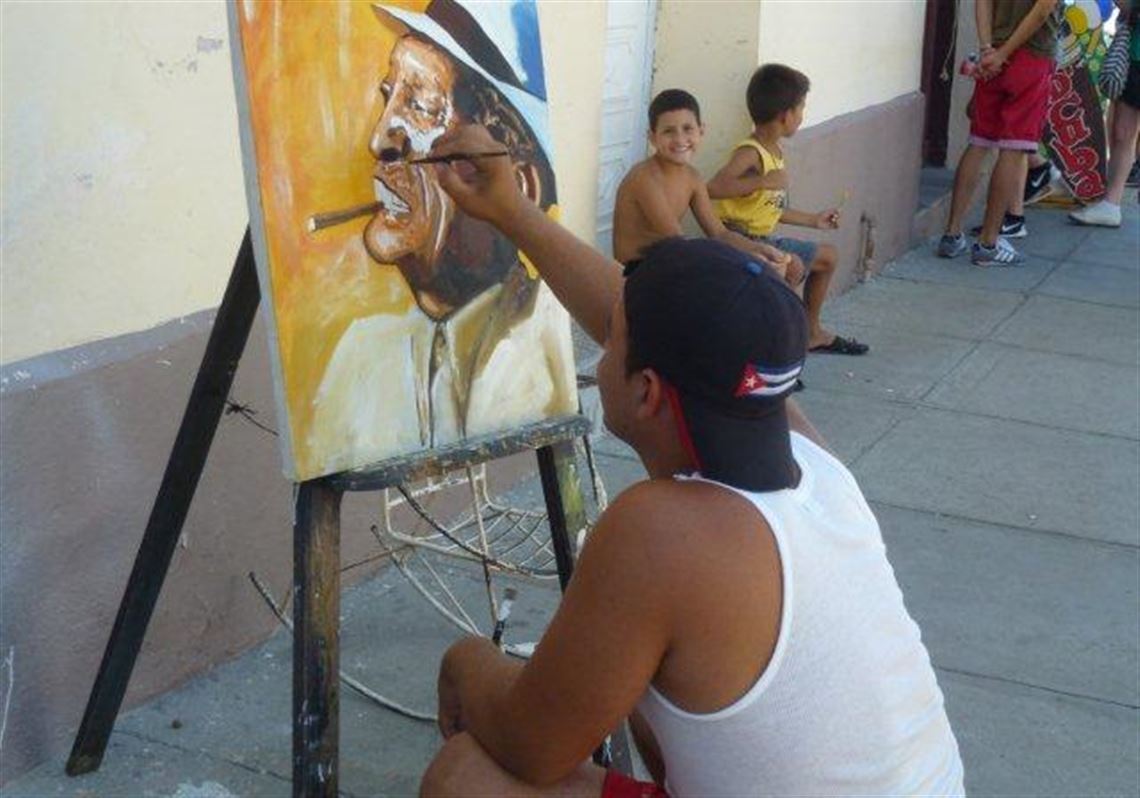
Our first first visit to Cuba 30-plus years ago could have landed us in hot water.
Ignoring the law barring American tourists from visiting the Communist island during the Cold War U.S. embargo, my wife and I sneaked into the country. We did it by following the risky path of other curious Americans who entered Cuba from another country with normal diplomatic relations with the Castro regime. In our case, it was via an Air Jamaica flight to Havana from Montego Bay.
Flouting the law in those days risked a hefty penalty: a fine of up to $250,000 and/or 10 years in jail.
Arriving in Havana, my wife, Dorothy, a former Spanish teacher, urged the Jose Marti Airport customs officer not to stamp our passports to eliminate evidence of our presence.
More:
https://www.post-gazette.com/opinion/insight/2022/10/30/havana-history-missile-crisis-castro/stories/202210300030
Bolsonaro and Allies Accused of Massive Vote-Buying Operation Ahead of Election
BY
Michael Fox, Truthout
PUBLISHED
October 29, 2022
In the northern Brazilian state of Pará, a couple of dozen men stand in a circle around local businessman Maurício Lopes Fernandes Júnior, who wears jean shorts and a blue shirt. He’s under a brick archway which circles a one-story yellow home. Sun beats down through a cloudy sky. It’s hot out. Some of the men are bare-chested, their shirts slung over their shoulders.
“Look,” says the businessman, holding their attention. “If Lula wins, you can be sure that more than half of São Miguel is going to close up. I have three ceramics factories here and I’m going to close all three, because if he wins no one’s going to be able to handle the mess that’s coming.”
“So I have a proposal for you,” he continues. “I’m going to get all of your names. And if president Bolsonaro wins, each of you is going to have 200 bills in the pocket. All you have to do is come by here the next morning.”
He claps his hands for emphasis. The men in the crowd murmur in apparent agreement.
A cellphone video of this scene went viral on Brazilian social media earlier this month. It was not an isolated case. Videos and audio recordings have been shared from across Brazil showing bosses or businessmen trying to coerce employees into voting almost exclusively for current far right president Jair Bolsonaro, who is facing off against former leftist President Luiz Inácio Lula da Silva.
More:
https://truthout.org/articles/bolsonaro-and-allies-accused-of-massive-vote-buying-operation-ahead-of-election/
U.S. Pressuring New Left-Wing Honduras Government
After the Honduran government fulfilled a campaign promise by moving to end an extreme form of special economic zone, two U.S. senators threatened to withdraw foreign aid to the country.
BY SARAH LAZARE OCTOBER 28, 2022

SETH SIDNEY BERRY/SOPA IMAGES/SIPA USA VIA AP IMAGES
People demonstrate against a proposed economic development zone that would forcibly relocate coastal communities from La Ceiba, in Honduras, May 31, 2021.
Honduran President Xiomara Castro, who took office in January, promised on the campaign trail to abolish special economic zones known as ZEDEs (“Economic Development and Employment Zones” in English), where private investors have outsized power to shape labor laws, judicial systems, and local governance. These zones have garnered fierce opposition in Honduras for undermining the basic tenets of democracy.
In April, she achieved a major win when the Congress of Honduras unanimously voted to repeal the law that allows for ZEDEs, and to abolish the current ones, though the latter has to be ratified next year. But the forces who want to keep ZEDEs in operation are retaliating, and they’ve found allies on Capitol Hill.
Earlier this month, Sens. Bill Hagerty (R-TN) and Ben Cardin (D-MD) called on U.S. Secretary of State Antony Blinken to act against the Honduran government for moving to get rid of ZEDEs. In doing so, the senators are citing the findings of an influential think tank, the Center for Strategic and International Studies (CSIS), which has received direct support from a U.S.-based company that is invested in one of the ZEDEs.
The senators are not the first federal players to rebuke the Honduran government. In July, the State Department issued its own condemnation of Castro’s move to eliminate ZEDEs, and intimated that the government could be violating two trade agreements, the Dominican Republic–Central America Free Trade Agreement (CAFTA-DR) and a U.S.-Honduras bilateral investment treaty (BIT). “The government has exposed itself to potentially significant liability and fueled concerns about the government’s commitment to commercial rule of law,” the State Department’s “investment climate statement” asserts.
More:
https://prospect.org/world/us-pressuring-new-left-wing-honduras-government-economic-zones/
How UK Backed Panama Invasion
October 27, 2022
Thatcher understood Washington’s 1989 invasion was illegal but supported it anyway, recently declassified documents show, John McEvoy reports.

Jan. 1, 1990: U.S. soldiers in Panama during the invasion. (U.S. National Archives)
By John McEvoy
Declassified UK
Shortly before 7 a.m. on Dec. 20, 1989, Margaret Thatcher received a call from U.S. President George H.W. Bush. Bush informed the U.K. prime minister that Washington had just launched an invasion of Panama, declaring that there had been “no alternative but to intervene.”
After decades on the C.I.A.’s payroll, Panama’s military leader Manuel Antonio Noriega had fallen out of favour with the White House, and the Bush administration decided it was time for him to go. That morning, over 20,000 U.S. troops descended on Panama, accompanied by the indiscriminate bombing of poor civilian areas thought to be Noriega strong-holds.
According to human rights organisations, up to 3,000 Panamanian civilians may have been killed during the invasion, with tens of thousands more displaced. The true figure of civilian casualties remains unknown — the U.S. forces didn’t bother to count the dead, with many thrown into mass graves.
Thatcher was the first foreign leader to be told of the operation. Over the phone, she assured Bush that “it was a very courageous decision which would have our full support.” Britain would “take the line that it was no good people criticising Noriega and then failing to support the Americans”.
More:
https://consortiumnews.com/2022/10/27/bang-just-like-that-how-uk-backed-panama-invasion/
~ ~ ~
The Panama Deception won an Oscar for Documentaries and was
narated by actress Elizabeth Montgomery.
Central Americans Are Fleeing Bad Governments
To Stanch Migration, Washington Must Address a Deeper Crisis
By Dan Restrepo
March 5, 2021
In January, thousands of people gathered in the Honduran city of San Pedro Sula to form a migrant caravan to travel north. “¡Fuera, Juan Orlando, fuera!” they chanted, referring to Honduras’s notoriously corrupt president. “Get out, Juan Orlando, get out!”
Honduras is one of the world’s poorest countries. It is also one of the most violent, especially for women. And along with its neighbors in northern Central America, it had just been devastated by two supposedly once-in-a-century storms that made landfall within 15 miles and two weeks of each other in November 2020.
All these factors help explain why tens of thousands of Hondurans flee their country every year. But the cry from those risking everything on a perilous journey through Guatemala and Mexico to the U.S. border pointed to a more fundamental driver of irregular migration from the region—the pervasive governance failures that have long plagued Honduras and its neighbors. To stem migration from Central America, previous U.S. administrations emphasized economic prosperity and security initiatives and failed to prioritize governance. The administration of U.S. President Joe Biden will have to try something new if it hopes to keep migration from the region at manageable levels. It will have to put governance first.
THE GOVERNANCE DEFICIT
Honduras, Guatemala, and El Salvador are not just poor and violent; they are beset by corruption and ineffectual, often predatory governance. On nearly all of the World Bank’s Worldwide Governance Indicators, including the effectiveness of government, rule of law, and control of corruption, countries in northern Central America lag well behind even their Latin American and Caribbean peers. And their citizens know it. Around the time the January caravan formed in San Pedro Sula, a public opinion survey revealed that even in a pandemic, an economic collapse, and the disastrous wake of Hurricanes Eta and Iota, more Hondurans—40 percent—identified corruption as the biggest problem facing the country than any other issue. Just 23 percent said unemployment and 12 percent said COVID-19.
Hondurans are not alone in decrying corruption. According to Transparency International’s 2020 Corruption Perceptions Index, which ranks 180 countries and territories by their perceived corruption levels, El Salvador and Guatemala rank 104 and 149, respectively. In Latin America’s benchmark public opinion survey, Latinobarómetro, Hondurans, Salvadorans, and Guatemalans routinely identify governance failures as among the most significant challenges facing their countries. In 2018, for example, no civilian governmental institution in any of these three countries enjoyed the confidence of more than 35 percent of the population, and most topped out in the teens and 20s. Satisfaction with democracy was even lower, at 11 percent in El Salvador, 18 percent in Guatemala, and 26 percent in Honduras.
More:
https://www.foreignaffairs.com/articles/central-america-caribbean/2021-03-05/central-americans-are-fleeing-bad-governments
Brazil politician, Bolsonaro ally refuses arrest, injures police after firing rifle
By Bruna Prado & Mauricio Savarese The Associated Press
Posted October 23, 2022 8:36 pm
A Brazilian politician attacked federal police officers seeking to arrest him in his home on Sunday, prompting an hours-long siege that caused alarm and a scramble for a response at the highest level of government.
Roberto Jefferson, a former lawmaker and an ally of President Jair Bolsonaro, fired a rifle at police and threw grenades, wounding two officers in the rural municipality Comendador Levy Gasparian, in Rio de Janeiro state. He said in a video message sent to supporters on WhatsApp that he refused to surrender, though by early evening he was in custody.
The events were stunning even for Brazilians who have grown increasingly accustomed to far-right politicians and activists thumbing their noses at Supreme Court justices, and comes just days before Brazilians go to the polls to vote for president.
The Supreme Court has sought to rein in the spread of disinformation and anti-democratic rhetoric ahead of the Oct. 30 vote, often inviting the ire of Bolsonaro’s base that decries such actions as censorship. As part of those efforts, Jefferson was jailed preventatively for making threats against the court’s justices.
More:
https://globalnews.ca/news/9220995/brazil-politician-bolsonaro-ally-roberto-jefferson-refuses-arrest/
~ ~ ~
A close ally of Bolsonaro is suspected of having thrown grenades at police officers
Post date
October 23, 2022
- Former Congressman Roberto Jefferson is suspected of throwing grenades at two police officers who came to arrest him at his residence on Sunday.
- Jefferson, who has long been a close ally of President Jair Bolsonaro, has been a central figure in Bolsonaro’s election campaign. Next Sunday there are elections in Brazil.
- One of the police is reported to be very seriously injured.
https://nord.news/2022/10/23/a-close-ally-of-bolsonaro-is-suspected-of-having-thrown-grenades-at-police-officers/
Guatemala's past unearthed: The search for the disappeared
A 40-year search for his disappeared father leads an Indigenous weaver into a world of forensic investigation.
Carlos Poyon was just three years old when his father was kidnapped. Forty years later, the traditional weaver studies anthropology, still hoping to find his father.
Carlos also works for the Forensic Anthropology Foundation of Guatemala. He records survivors’ testimonies, takes DNA samples of those seeking missing loved ones and joins excavations to recover the remains of the disappeared.
Up to 45,000 people disappeared during Guatemala’s 36-year internal conflict. More than 80 percent of them were Indigenous Mayan civilians.
Carlos and thousands of survivors still seek truth and justice 25 years after the 1996 peace accords.
17 Oct 2022
https://www.aljazeera.com/program/witness/2022/10/17/guatemalas-past-unearthed-the-search-for-the-disappeared
Indigenous women in Guatamala are defending weavings from cultural appropriation
By pushing for intellectual property legislation and documenting the disappearing meaning of their designs, Indigenous weavers are challenging the tourism industry.
Jeff Abbott October 20, 2022
The vibrant colors of the Indigenous weavings from Guatemala that appear on the traditional blouses known as huipiles, skirts and other items hold a deep symbolic meaning for communities across the Central American country, but they are also deeply intertwined with the promotion of tourism in Guatemala. The intricate designs greet tourists in promotional material at the airport, and companies and non-government organizations have sought to capitalize on the designs.
For the last six years, Indigenous women have sought to challenge the exploitation of their sacred designs through the promotion of legislation that would protect their collective intellectual property rights. On Sept. 5, the Women’s Association for the Development of Sacatepéquez, or AFEDES, and the weavers of the Ruchajixik Ri Qana’ojbäl movement, which means Guardians of Our Knowledge in the Kaqchikel language, presented their latest proposal for a law that would protect their weavings.
The proposal is backed by members of the leftist block in congress, and its presentation to lawmakers marked the fifth weavers congress, which brought together hundreds of weavers from their movement from across the country to discuss and exchange experiences and weavings in Guatemala City. Yet the weavers have also sought to find multi-party support for the legislation, in the hopes that the law will advance in the current congress.
“We are defending the weavings, because it is also part of defending our land, our territory,” said Ixchel Guorón Rodríguez, a weaver and member of the movement from Tecpán, Chimaltenango. “It is part of a legacy that our grandmothers have left us, and we see different problems regarding the improper use that is already done by others.”
More:
https://wagingnonviolence.org/2022/10/indigenous-women-guatemala-defend-weavings-from-cultural-appropriation/




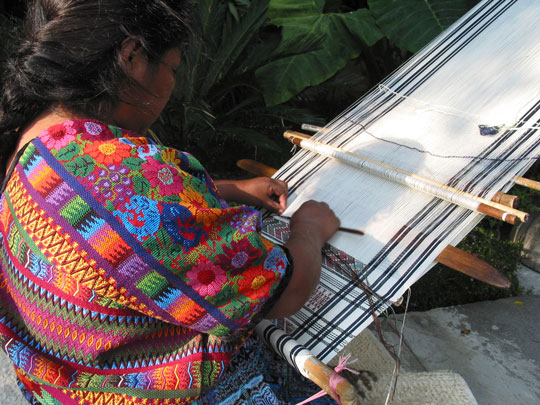

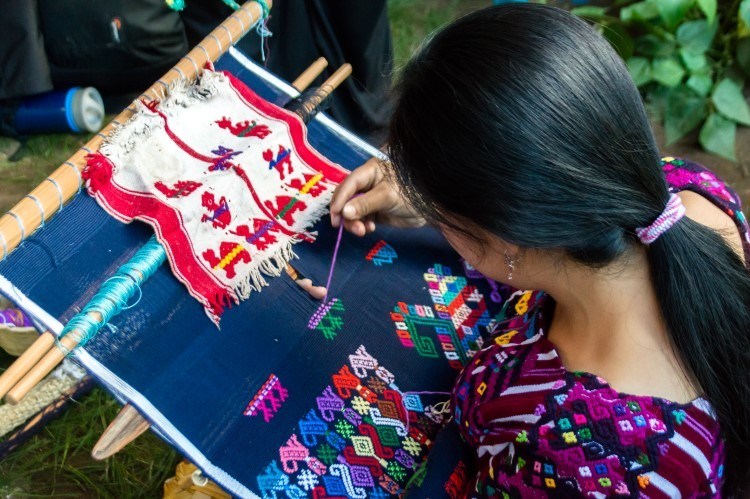


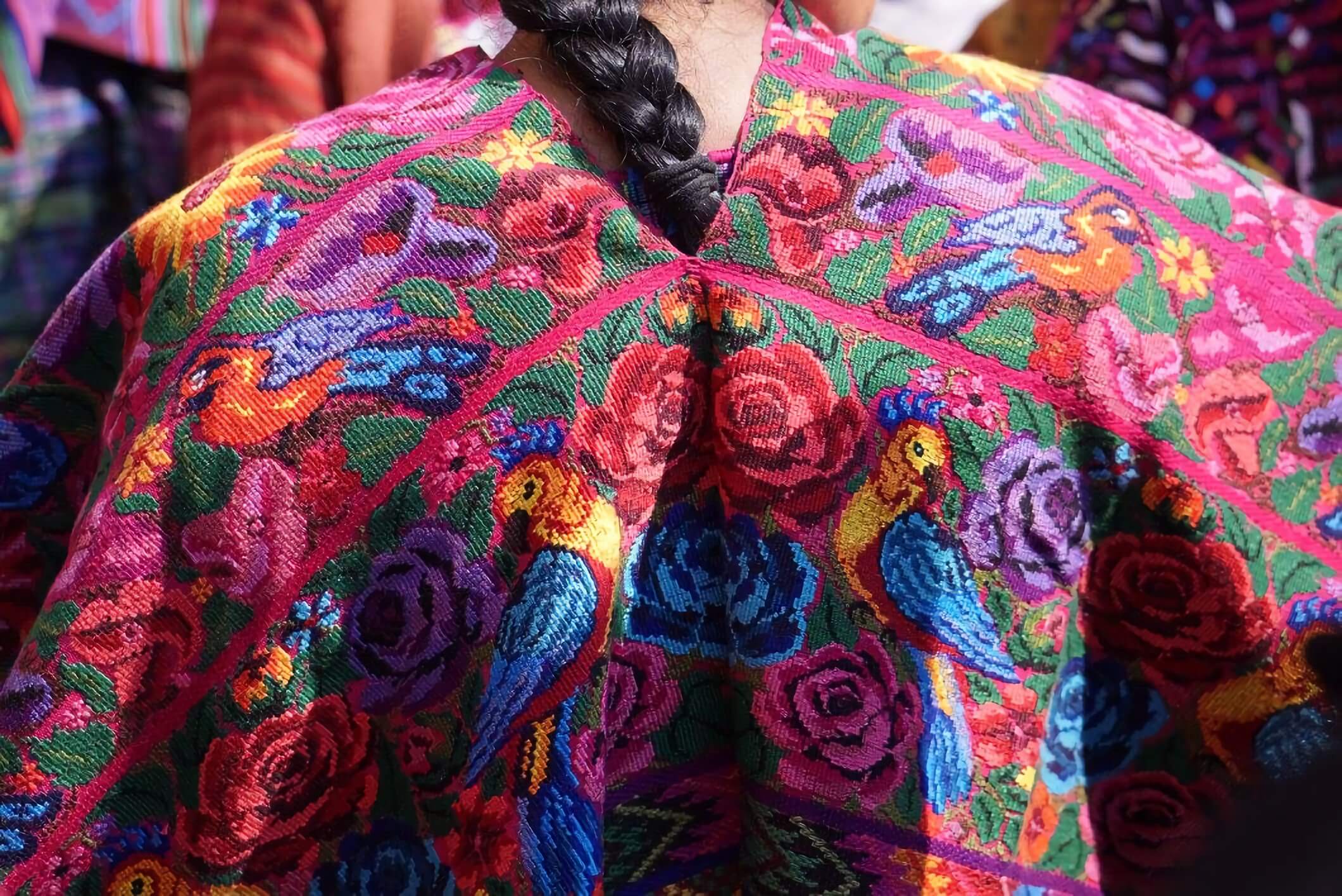
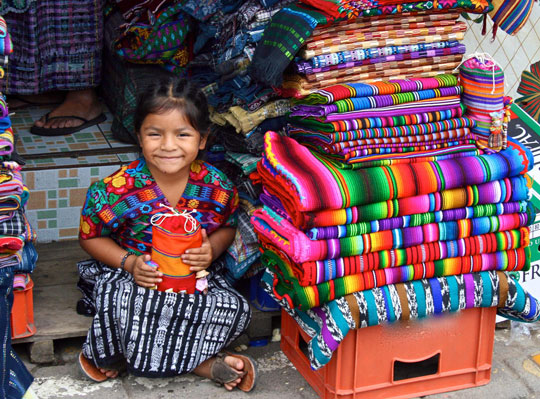
Profile Information
Member since: 2002Number of posts: 160,527